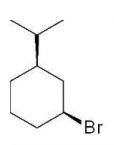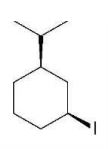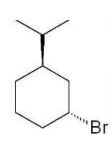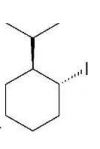Deck 9: Substitution and Elimination Reactions of Alkyl Halides
Question
Question
Question
Question
Question
Question
Question
Question
Question
Question
Question

Unlock Deck
Sign up to unlock the cards in this deck!
Unlock Deck
Unlock Deck
1/11
Play
Full screen (f)
Deck 9: Substitution and Elimination Reactions of Alkyl Halides
1
What happens in the following SN2 reaction if the concentration of both reagents is doubled? 
A) The reaction rate doubles.
B) The reaction rate triples.
C) The reaction rate is quadrupled.
D) The reaction rate is unaffected.
E) The reaction rate is halved.

A) The reaction rate doubles.
B) The reaction rate triples.
C) The reaction rate is quadrupled.
D) The reaction rate is unaffected.
E) The reaction rate is halved.
The reaction rate is quadrupled.
2
Which of the following factors favor an SN2 reaction with a negatively charged nucleophile?
A) a good leaving group
B) a good nucleophile
C) an unhindered reaction center
D) an aprotic polar solvent
E) all of the above
A) a good leaving group
B) a good nucleophile
C) an unhindered reaction center
D) an aprotic polar solvent
E) all of the above
all of the above
3
Which of the following species is the best nucleophile in methanol?
A) F?
B) NH3
C) CH3S?
D) CH3O?
E) HO?
A) F?
B) NH3
C) CH3S?
D) CH3O?
E) HO?
CH3S?
4
Which of the following substrates react fastest in an SN2 reaction?
A) vinyl bromide
B) cyclohexyl bromide
C) phenyl iodide
D) 2-bromopropane
E) benzyl bromide
A) vinyl bromide
B) cyclohexyl bromide
C) phenyl iodide
D) 2-bromopropane
E) benzyl bromide

Unlock Deck
Unlock for access to all 11 flashcards in this deck.
Unlock Deck
k this deck
5
Which of the following best explains a partial racemization?
A) a good leaving group
B) an SN2 reaction
C) formation of an intimate ion pair
D) completely dissociated ions
E) a polar solvent
A) a good leaving group
B) an SN2 reaction
C) formation of an intimate ion pair
D) completely dissociated ions
E) a polar solvent

Unlock Deck
Unlock for access to all 11 flashcards in this deck.
Unlock Deck
k this deck
6
Which of the following statements is not true about the SN1 reaction of an alkyl halide?
A) Tertiary alkyl halides and benzyl and allyl halides undergo SN1 reactions.
B) The rate is dependent upon the stability of the carbocation.
C) The rate is dependent upon the concentration of the nucleophile.
D) The reaction requires a good leaving group.
E) The reaction is favored in a polar protic solvent.
A) Tertiary alkyl halides and benzyl and allyl halides undergo SN1 reactions.
B) The rate is dependent upon the stability of the carbocation.
C) The rate is dependent upon the concentration of the nucleophile.
D) The reaction requires a good leaving group.
E) The reaction is favored in a polar protic solvent.

Unlock Deck
Unlock for access to all 11 flashcards in this deck.
Unlock Deck
k this deck
7
Which of the following statements is false?
A) Increasing solvent polarity decreases the reaction rate when any reactant is charged.
B) Increasing solvent polarity increases the reaction rate when none of the reactants is charged.
C) An E2 reaction is favored by a high concentration of a strong, hindered base.
D) An E1 reaction is favored by a secondary alkyl halide.
E) An E2 is favored by a strong base.
A) Increasing solvent polarity decreases the reaction rate when any reactant is charged.
B) Increasing solvent polarity increases the reaction rate when none of the reactants is charged.
C) An E2 reaction is favored by a high concentration of a strong, hindered base.
D) An E1 reaction is favored by a secondary alkyl halide.
E) An E2 is favored by a strong base.

Unlock Deck
Unlock for access to all 11 flashcards in this deck.
Unlock Deck
k this deck
8
Which of the following compounds undergoes an E2 reaction most readily?
A)
B)
C)
D)
E)
A)

B)

C)

D)

E)


Unlock Deck
Unlock for access to all 11 flashcards in this deck.
Unlock Deck
k this deck
9
Which of the following bases most favors elimination over substitution?
A)
B)
C)
D)
E)
A)

B)

C)

D)

E)


Unlock Deck
Unlock for access to all 11 flashcards in this deck.
Unlock Deck
k this deck
10
Which alkyl halide reacts the fastest with sodium methoxide under E2 conditions?
A)
B)
C)
D)
E)
A)

B)

C)

D)

E)


Unlock Deck
Unlock for access to all 11 flashcards in this deck.
Unlock Deck
k this deck
11
In the following reaction, which base most favors the anti-Zaitsev product?

A)
B)
C)
D)
E)

A)

B)

C)

D)

E)


Unlock Deck
Unlock for access to all 11 flashcards in this deck.
Unlock Deck
k this deck


